Integrative cancer scholars program gives U of A cancer center graduate students experience with top scientists, oncologists
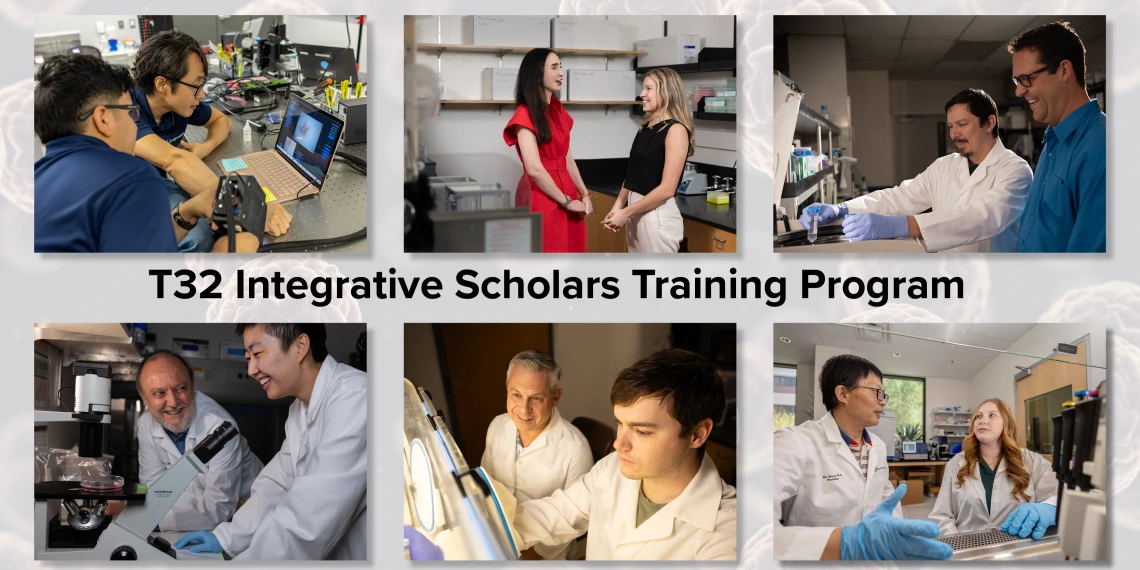
Rafael Romero has spent the last year refining his prototype of an affordable, handheld skin cancer detector the size of a large cell phone that can be used on patients by merely pressing it against their skin.
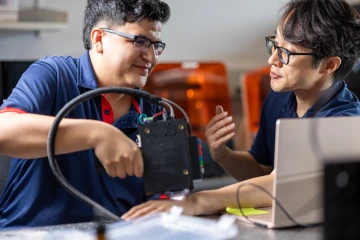
From left, student Rafael Romero practices using his latest skin cancer detection prototype on Professor D.K. Kang in the Kang Lab.
He is now taking that novel device into the clinic for testing under the guidance of Clara Curiel-Lewandrowski, MD, Co-Principal Investigator of the NCI T32 Integrative Scholars Training Program, co-director of the University of Arizona Cancer Center Skin Cancer Institute and professor at the U of A College of Medicine.
Through the Integrative Scholars Training Program, Romero, a graduate student in biomedical engineering, will train in the translational optical imaging lab of DongKyun Kang, PhD a U of A Cancer Center member and associate professor in optical sciences, biomedical engineering and the BIO5 Institute.
Romero considers this unique mentorship program crucial to his future career.
“I've been fortunate to have mentors like Dr. Kang and Dr. Curiel who have helped me understand my work's clinical implications,” Romero said. “Having this mentorship ensures that my research focuses on real-world applications that improve patient care.”
Advancing the field of cancer research through mentorship
For 45 years, the U of A Cancer Center has offered doctoral students the Integrative Cancer Scholars Program, which is funded through an NIH National Cancer Institute T32 National Research Service Award.
This year, the Cancer Center chose six integrative cancer scholars from more than 30 graduate applicants. Each scholar is from a different area of cancer research spread across various disciplines at the U of A.
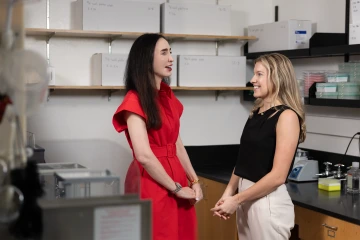
From left, Professor Jennifer Carew and student Madison Gamble meet in the Carew-Nawrocki Lab in the U of A Cancer Center administrative building.
Jennifer Carew, PhD, is the principal investigator of the project, and professor of medicine at the U of A College of Medicine – Tucson. She is also a member of the U of A Cancer Center Clinical and Translational Oncology Program.
Carew believes that receiving outstanding mentorship from an early-career stage is one of the most important determinants of long-term success for future leaders in translational cancer research on a national and international level.
“My goal as a mentor is to ensure that each person who trains in my lab leaves with a substantial record of achievements and is fully prepared for the next phase of their career development journey,” she said.
Carew thinks that translational laboratory and clinical co-mentorship, which is a key strength of the Integrative Cancer Scholars Program, reflects her own experiences and research philosophy.
“I developed a passion for collaborating closely with clinicians to maximize the patient impact of my work during my early days as a PhD student at MD Anderson Cancer Center,” Carew said. “Nearly every article I’ve published includes clinical co-authors. The integration of the clinic into my lab has been pivotal to the success of moving multiple preclinical studies into early phase clinical trials.”
Madison Gamble (mentors Jennifer Carew and Sharad Khurana)
Madison Gamble said she is passionate about the development of novel cancer therapeutics because she wants her work to have a direct impact on patient outcomes. She was awarded a highly competitive summer research internship at the major pharmaceutical company AstraZeneca as an undergraduate student. She chose the Carew and Nawrocki lab to pursue her dissertation research after joining U of A to further her training in therapeutic development.
“Every time I step into the lab, I’m able to see the potential of our discoveries with investigational therapies,” she said. “This is incredibly motivating for me.”
Gamble applied for the T32 training program because of its prestigious reputation and the unique, bench-to-bedside training experience it offers. “It aligns perfectly with my goal to develop a career as a translational cancer researcher,” she said.
Gamble’s research project is focused on investigating the mechanism of action of a novel drug candidate to treat acute myeloid leukemia. This agent was discovered at the U of A in partnership with the Arizona Center for Drug Discovery.
“Patients with AML desperately need new therapies, and I am excited that my project has the potential to address this critical need,” Gamble said.
Alexis Cruickshank-Taylor (mentors Wei Wang and Sharad Khurana)
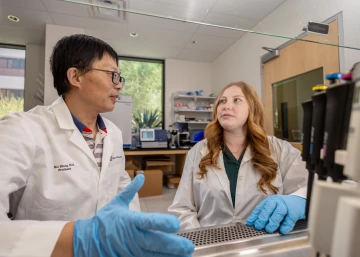
From left, Professor Wei Wang meets withT32 scholar Alexis Cruickshank-Taylor in the Wang Lab on the University of Arizona campus.
Alexis Cruickshank-Taylor is from Arizona and earned many academic distinctions prior to joining the Integrative Scholars Training Program including the prestigious BIO5 KEYS internship, the W.A. Franke Honors Silver Award, and the Dr. Thomas M. and Candace C. Grogan Scholar award. She said she wants to conduct research in a field that is focused on human health and disease and improving quality of life for patients. Cruickshank-Taylor’s research focuses on designing molecules that more effectively target murine double minute 2 (MDM2) activity for acute myeloid leukemia therapy.
“One of the classes I took as an undergrad was about anti-cancer drugs,” she said. “I found a new passion in learning about the mechanisms of current anti-cancer drugs and saw many opportunities to discover new ways to treat cancer.”
Cruickshank-Taylor applied for the T32 Integrative Scholars Training Program because she was excited about the opportunity to work closely with a laboratory and clinical mentorship team to maximize the translational impact of her research project.
Cruickshank-Taylor’s primary mentor is cancer center member Wei Wang, PhD, a UACC Clinical and Translational Oncology Program member and professor in the Department of Pharmacology and Toxicology in the R. Ken Coit College of Pharmacy. Wang also serves as co-director of the Arizona Center for Drug Discovery.
“The T-32 program provides unique research training opportunities and helps prepare the next generation of talented biomedical scientists, like Alexis, to become leaders in the field,” Wang said. “It’s training structure and focused resources keep them engaged and interested and ensures their academic success.”
Wang said that mentorships can help mentees gain valuable experience in cancer research.
“The mentors guide them to prioritize clinical impact while acquiring key skills in basic experimental, problem-solving, critical thinking, and cutting-edge technologies in oncology to prepare them for their next career stage,” he said. “This training program also helps to increase the diversity of people, particularly those from underrepresented groups, working in cancer research.”
Jesse Altemus (mentors Jacob Schwartz and Aaron Scott)
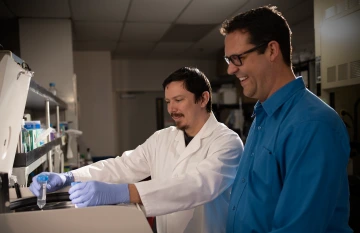
From left, T32 scholar Jesse Altemus works in a lab under the guidance of Jacob Schwartz, associate director of the cancer center Cancer Research and Training Coordination Program.
Jesse Altemus chose cancer as a field of research after several people in his life developed cancer––some of whom died from the disease. Altemus now studies molecular mechanisms in Ewing sarcoma, a rare aggressive bone cancer that primarily affects youth.
He works with his lead mentor, Jacob Schwartz, PhD, an associate research professor in the College of Medicine – Tucson, Department of Pharmacology and associate director of the cancer center’s Cancer Research Training and Education Coordination Program. In the clinic, Altemus works with his co-mentor, Aaron Scott, MD, an associate professor for the U of A College of Medicine – Tucson Department of Medicine, and co-program leader for the cancer center’s Clinical and Translational Oncology Program. Under Scott, Altemus gets the opportunity to see how clinical trials are run.
“As I understood more of the basic science and underlying mechanisms of cancer, I wanted to know how research is translated to the clinic. As a result, I’m working with my clinical co-mentor to see the applications of drugs in Phase I clinical trials on patient outcomes,” Altemus said.
Altemus came to the U of A Cancer Center because it offered him an opportunity to perform cutting-edge research and work with top scientists and clinicians in the field. The facilities at the center include a microscopy core with super-resolution and high throughput microscopes, a flow cytometry unit, and a genome editing facility for acquiring the data necessary to make discoveries.
“While at the U of A, I developed a further interest in the scientific aspects of cancer risk development, tumor microenvironments, and therapeutic targets,” Altemus said.
Matthew Coope (mentors Gregory C. Rogers and Benjamin Lee)
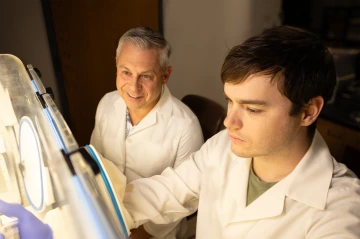
From left, Professor Gregory Rogers watches student Matthew Coope as he examines specimens in the Rogers Lab.
Matthew Coope said he became fascinated by cancer research the first time he imaged patient tissue samples.
“Why did some tissue seem healthy while just a hair’s breadth away were cells that would lead to this patient’s death?” Coope said. “I hope to shed light on this question in the coming years.”
Coope is in the cancer biology graduate interdisciplinary program for cancer biology. He has worked as a research technician with Gregory C. Rogers, PhD, for more than three years. Rogers is a U of A Cancer Center member in the Cancer Biology Program and a professor in the Department of Cellular and Molecular Medicine at the University of Arizona and the BIO5 Institute.
At each stage of developing his bench skills, Coope has had support from Rogers or more senior students. “Now I appreciate that mentorship more than ever,” Coope said about working on his project. “I value discussing and interpreting exciting results, formulating hypotheses and new methods to test them, and troubleshooting failed experiments.”
Coope’s T32 research is on prostate epithelial organoids and the regulation of their organization.
“Prostate cancer is incredibly common, but rarely lethal,” Coope said. “Understanding the mechanism of how a slow disease progresses into an aggressive metastasis is my key interest. I hope my research will provide new tools to help clinicians decide between a ‘wait and watch’ approach and aggressive treatment.”
“I love contributing to the education and training of junior scientists,” Rogers said. “Watching them learn, succeed and grow into independent, confident scientists is very rewarding to me. Practically speaking, graduate students are the lifeblood of research at U of A. Without graduate students to perform the research, we would not be a top tier research institution.”
Manlin Shao (mentors Carlos Caulin and Steven Wang)
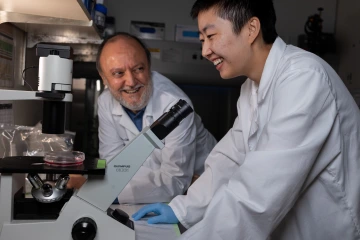
From left, Professor Carlos Caulin laughs with student Manlin Shao in the Caulin Lab.
Manlin Shao said she became captivated by cancer research when she started to see its complexity and the various directions that can be pursued in prevention, therapy and personalized medicine. Shao’s project focuses on how a mutation in the tumor suppressor gene p53, affects the recruitment of tumor-associated white blood cells called macrophages.
These white blood cells kill microorganisms, remove dead cells, and contribute to the development and progression of oral squamous cell carcinoma–malignant tumors that grow in the mouth from squamous cells found in skin as well as respiratory and digestive tracts.
Oral squamous cell carcinoma ranks as the sixth most common cancer globally and is closely linked to poor prognosis and chemotherapy resistance.
“Given the potential impact of research on patient outcomes, I believe that developing cancer treatments is profoundly significant and impactful—not only for OSCC but for all types of cancer,” Shao said.
Shao is enrolled in the MD/PhD physician scientist program at the U of A COM-T and chose to work with Carlos Caulin, PhD, because he aligns with her research interests. Caulin is a member of the cancer center’s Cancer Biology Program and an associate professor in the U of A College of Medicine – Tucson, Department of Otolaryngology.
“Overall, the supportive and collaborative environment at the U of A is an ideal setting for my academic and professional growth,” Shao said.
Through her educational journey, Shao has greatly benefited from her mentors across a variety of fields in basic science research, clinical research, and academia.
“Mentorship for me goes beyond seeking help. It involves learning from their daily behaviors, absorbing their work ethics, and aspiring to their thought processes,” she said.
Caulin thinks the Integrative Cancer Scholars program is unique due to its emphasis on promoting translational cancer research for clinical applications.
“This approach encourages graduate students to explore fundamental cancer research questions that may lead to discoveries that could benefit cancer patients,” he said. “As these students develop as scientists, their curiosity about cancer biology will drive them to uncover processes that may lead to new therapeutic opportunities.”
He thinks the program fosters a community of graduate students who share this vision, promoting collaborations and helping them build long-lasting professional relationships.
“Graduate students are the future of research in both academic and industry settings,” Caulin said. “They’ll be leaders in their fields, driving research progress in the future.”



